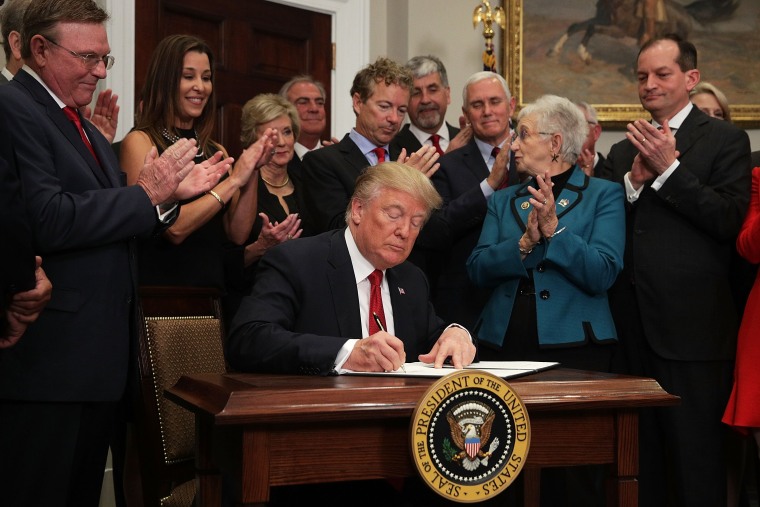Ten weeks ago, speaking from one of his golf resorts, Donald Trump declared, "The opioid crisis is an emergency, and I'm saying officially, right now, it is an emergency. It's a national emergency." His use of the word "officially" led many to assume a White House declaration would soon follow, initiating a series of policy measures.
But Trump followed up with nothing. New Jersey Gov. Chris Christie (R), the man the president appointed to lead a White House opioid commission, conceded recently that Trump's inaction is "not good."
Asked on Monday when we might see a declaration, the president gave himself a deadline. "We are going to be doing that next week," Trump said, adding, "That is a very, very big statement. It's a very important step. And to get to that step, a lot of work has to be done and it's time-consuming work. We're going to be doing it next week, okay?"
According to a new Politico report, the answer from Trump administration officials was no, it's not okay.
Blindsided officials are now scrambling to develop such a plan, but it is unclear when it will be announced, how or if it will be done, and whether the administration has the permanent leadership to execute it, said two administration officials."They are not ready for this," a public health advocate said of an emergency declaration after talking to Health and Human Services officials enlisted in the effort. Trump's off-script statement stunned top agency officials, who said there is no consensus on how to implement an emergency declaration for the drug epidemic.
Top members of the Trump administration don't even agree on whether there should be a declaration, and Politico's report noted that leaders from relevant federal agencies haven't yet been asked "to draw up strategies and tactics."
A senior FDA official added that the entire endeavor is "such a mess."
While we wait to see if and when Trump World can get its act together, it's worth remembering that the president's habit of just blurting out problematic comments -- both on Twitter and in public remarks -- has caused these kinds of problems several times in recent months.
Top members of Trump World were blindsided, for example, by the president's contentious speech to the United Nations. There was a similar reaction among leading administration officials -- including members of his own cabinet -- after Trump's speech to NATO officials.
As we talked about in August, the president's team was caught off guard when he expressed support for Sen. Jeff Flake's (R-Ariz.) primary opponent. Trump’s aides were equally surprised to learn that he’d announced via Twitter that Christopher Wray was his choice to lead the FBI. They were also startled to read Trump’s tweets banning transgender Americans from military service.
As we discussed a couple of weeks ago, White House aides also didn’t know in advance that Trump would falsely accuse Barack Obama via Twitter of tapping his phone. They also had no idea that the president would tweet news about his new chief of staff. Politico recently highlighted an instance from earlier this year in which Trump lashed out at China via Twitter “while U.S. officials were meeting with a Chinese delegation at the State Department.”
My personal favorite was this recent Associated Press report:
Aides to President Donald Trump were in deep talks about how to defuse tensions between Qatar and other Arab nations when the door to the secure room at the White House burst open.The urgent message: Trump had just tweeted about Qatar.One adviser read the tweet aloud and with that, the policymakers in midconference call had no other choice but to rework their plans to reflect the president’s tweeted assertion that Qatar, host to some 11,000 U.S. troops, was funding terrorism.It was an accusation against a close U.S. ally that had never been voiced so publicly and with such indelicacy.
The conventional wisdom is many of the people around Trump can contain him and keep the president from acting on his worst impulses. This contention may sound comforting, right up until we realize that much of his team has no idea what Trump will blurt out next.
